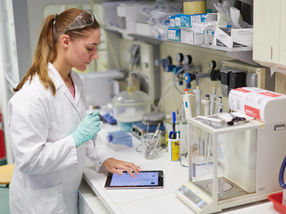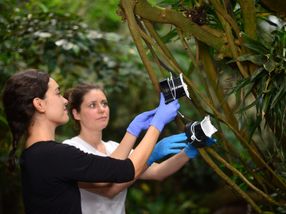Merck Total Revenues for 2011 Rise 11%, Surpassing € 10 Billion
Transformation process begins
“Merck delivered a good operational result in a challenging year, including surpassing € 10 billion in total revenues for the first time in the company’s history,” said Karl-Ludwig Kley, Chairman of the Merck Executive Board. “We managed to deliver on our profitability guidance despite facing a softening economy and significant one-time charges. However, we recognize that the competitive and market pressures we face in our businesses are likely to increase over the next few years. As a result, we recently initiated an efficiency program across all businesses and regions to enable us to address our inefficiencies and free up resources to invest in promising growth markets.”
Total revenues of the Merck Group increased by 11% to € 10,276 million in 2011 from € 9,291 million in 2010. This performance was slightly above the company’s guidance despite a challenging global economic environment. All four of Merck’s divisions contributed to this growth. The reported revenue increase was primarily due to the acquisition of Millipore Corporation, which closed in July 2010. In the fourth quarter of 2011, total revenues rose 3.1% to € 2,626 million compared to the year-ago quarter.
Merck reported organic revenue growth of 4.8% in 2011. The impact from acquisitions and divestments increased total revenues by 6.4% while foreign exchange rates lowered total revenues by 0.6% compared to 2010. At € 370 million, royalty, license and commission income was slightly higher than in 2010.
Full-year cost of sales rose by 17% to € 2,788 million and the gross margin rose by 8.4% to € 7,488 million in 2011. In the fourth quarter, cost of sales decreased 7.0% and the gross margin rose 7.5% to € 1,917 million.
Full-year marketing and selling expenses increased by 7.1% to € 2,393 million, largely due to the fact that in 2010, marketing and selling expenses of the Millipore companies were only included for six months. Royalty, license and commission expenses rose to € 512 million from € 480 million, mainly due to increased sales of Rebif® and Erbitux®.
Other operating income and expenses were 49% higher at € -582 million. This sharp increase was due largely to the asset impairment of the Large-Scale Biotech production plant (LSB) at the Merck Serono Biotech Center in Switzerland during the second quarter, which amounted to € 165 million. Also under other operating expenses and income were: € 13 million for the discontinuation of development of cladribine tablets for multiple sclerosis; transaction and integration costs for Millipore of € 38 million (€ 87 million in 2010).
Research and development spending increased 8.6% to € 1,517 million in 2011 mainly due to expensive late-stage clinical trials of Merck Serono. This figure also includes expenses of € 42 million for research and development activities still to be performed in connection with the return of the rights to safinamide to Newron Pharmaceuticals. For the fourth quarter, R&D rose by 9.6% to € 397 million.
Amortization of intangible assets rose 23% to € 1,005 million in 2011 from € 819 million in the previous year. This mainly includes amortization of intangible assets in connection with the purchase price allocation for Serono and Millipore. It should be noted that in 2010, amortization for Millipore was only booked for half the year. In addition, in the second quarter of 2011, the estimate of the remaining useful life of Rebif® was shortened by two years owing to the increasing market influence of oral forms of treatment for multiple sclerosis. Other Merck Serono impairments included € 50 million for the residual book value of cladribine and € 63 million for safinamide, as well as € 35 million for the discontinuation of the development of the cancer treatment candidate IMO-2055.
Due to the one-time expenses mentioned above, the Group’s full-year operating result declined 12% to € 985 million, in line with the company’s guidance. For the fourth quarter, the Group operating result more than doubled to € 292 million from € 129 million in the year-ago quarter, which was burdened by several one-time charges.
The full-year underlying core operating result, which excludes Merck Serono- and Merck Millipore-related amortization of intangible assets and other one-time charges, was slightly above the company’s guidance of € 2,250 million at € 2,294 million, or 22.3% of total revenues, compared to € 2,096 million, or 22.6% of total revenues, in 2010. For the fourth quarter, the underlying core operating result increased 5.1% to € 565 million.
Exceptional items in 2011 amounted to € 152 million compared to € -0.8 million in the previous year. A gain of € 157 million on the divestment of the Crop BioScience business was the main contributor. Full-year earnings before interest and tax (EBIT) rose 2.2% to € 1,137 million, or 11.1% of total revenues, compared to € 1,113 million, or 12.0% of total revenues, in 2010.
The financial result rose to € -286 million in 2011 from € -252 million in the previous year. The marked increase of 14% was due mainly to expenses resulting from the financing for Millipore and exchange rate differences. Adjusted for exceptional items, the tax ratio was 26.1%, compared to 25.3% in 2010.
Profit after tax amounted to € 629 million, which is 2.0% less than in 2010. Fourth-quarter profit after tax jumped to € 139 million in 2011 from € 46 million in the year-ago quarter, which had lower total revenues and higher amortization expenses.
Merck had 40,676 employees worldwide on December 31, 2011, compared to 40,562 on December 31, 2010.

























































